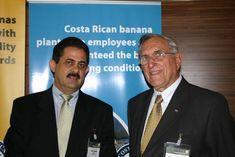
Corbana, the national organisation of banana producers of Costa Rica, has reiterated its concerns about the new EU tariffs, which is due to be imposed to the tune of €230/metric tonne on banana imports from January 1, 2006).
Corbana president Romano Orlich said yesterday that Costa Rica is hoping for a favourable result from the arbitration process taking place at the WTO in Geneva.
He said the €230 a tonne tariff could have negative consequences for his country’s industry. “We believe that the new EU proposed tariff at €230 per metric tonne would cripple if not destroy the whole banana industry,” said Orlich, “A significant increase in the present €75 import tariffs on dollar bananas could prove devastating to the Costa Rican banana growers. Furthermore, new EU tariffs could endanger the social and environmental efforts that we have been working on for more than 30 years”, he stressed. “The new import regulations could lead to a reduction of Costa Rican market share and a fall in turnover.
Corbana supports the imposition scheme based on preferential tariffs, as long as the latter is equal or inferior to €75 a metric tonne. A tariff at this level would enable Costa Rica to survive and continue to supply the EU market.
Costa Rica is the second largest provider of bananas to the EU, representing 28 per cent of EU imports from Latin America.
Workers on Costa Rican banana farms enjoy superior living conditions and higher salaries than those in the rest of the national agricultural sector, according to Corbana, and well above the average wage in the global banana industry.
The organisation has worked intensively to increase productivity within the framework of sustainable agriculture in the last 30 years. Now, less than one per cent of Costa Rican territory is used for banana production, yet it remains the world’s second largest banana exporter. Government, the agricultural sector and the wider business community continue working together on initiatives to improve the natural environment.
Corbana said in a statement: “Unfortunately, decisions being taken in Brussels and Geneva about the new banana import regime could make it difficult for Costa Rican farmers to preserve such a high level of social and environmental standards and remain competitive. Furthermore, the increased tariffs would also affect the European consumers who will end up paying more for the Costa Rican high quality bananas.”



